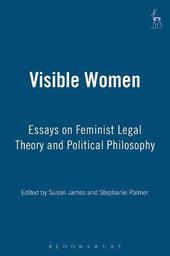
|
Visible Women: Essays on Feminist Legal Theory and Political Philosophy
Hardback
Main Details
| Title |
Visible Women: Essays on Feminist Legal Theory and Political Philosophy
|
| Authors and Contributors |
Edited by Professor Susan James
|
|
Edited by Stephanie Palmer
|
| Physical Properties |
| Format:Hardback | | Pages:216 | | Dimensions(mm): Height 234,Width 156 |
|
| ISBN/Barcode |
9781841131955
|
| Classifications | Dewey:340.082 |
|---|
| Audience | | Undergraduate | | Postgraduate, Research & Scholarly | | Professional & Vocational | |
|---|
|
Publishing Details |
| Publisher |
Bloomsbury Publishing PLC
|
| Imprint |
Hart Publishing
|
| Publication Date |
1 February 2002 |
| Publication Country |
United Kingdom
|
Description
How should feminist theories conceive of the subject? What is it to be a legal person? What part does embodiment play in subjectivity? Can there be a conception of rights which does justice to the social contexts in which rights claims are embedded? Is the way the law constitutes legal subjects a form of violence? These questions lie at the heart of contemporary feminist theory, and in this collection they are addressed by a group of distinguished international scholars working in law, philosophy and politics. The volume, in which the concerns of one author are taken up by others, advances current debate on two interconnected levels. First, it contains original discussions of the questions raised above. At the same time, it contains a more reflexive strand of argument about the intellectual resources available to feminist thinkers, and the advantages and dangers of borrowing from non-feminist traditions of thought. It thus provides a rich examination of contemporary legal and political feminist theory.
Author Biography
Susan James is Professor of Philosophy at Birkbeck College,University of London. Stephanie Palmer is a Lecturer in Law at Cambridge University and a Fellow of Girton College.
Reviews...the feminism of Visible Women is first and foremost a feminism that seeks to keep women visible, without succumbing to the simplicity of earlier versions of the subject. It is a feminism that is unapologetic in its focus on women, while at the same time, engaging critically with the category itself. And it is a feminism that is unapologetically theoretical. It does not shy away from the critical and intellectual project of rethinking the foundational categories of feminism. -- Brenda Crossman * Adelaide Law Review *
|